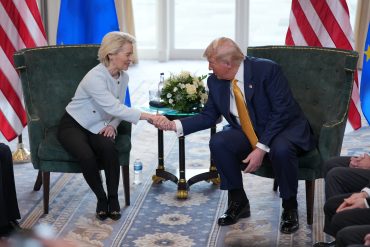
European Central Bank Keeps Interest Rates at 4% to Fight Inflation
6 minute read

ECB’s Unanimous Vote Maintains Record-High Interest Rates as Eurozone Battles Persistent Inflation
Three Key Facts
- The European Central Bank unanimously maintained high interest rates at 4% as a primary tool to combat persistent inflationary pressures across the Eurozone
- China ranks second globally in unicorn companies and leads in PCT international patent applications, with 24.8% of China-UK co-authored academic papers showing citation impact twice the global average
- Mastercard Brazil secured exclusive rights to distribute Lina’s open finance services within the payments segment while expanding virtual card integration through Oracle’s ERP software
Introduction
Central banks across Europe maintain their hawkish stance as the European Central Bank unanimously voted to keep interest rates elevated at 4%, underscoring the institution’s unwavering commitment to controlling inflation. This decision reflects broader global economic concerns as financial institutions worldwide balance growth objectives with price stability mandates.
The monetary policy announcement coincides with significant diplomatic and business developments spanning multiple continents. British Finance Minister Rachel Reeves prepares for high-stakes meetings with Chinese Vice Premier He Lifeng, while technology cooperation between China and the UK gains momentum despite geopolitical tensions.
Key Developments
ECB President Christine Lagarde emphasized the importance of maintaining a “sustained approach” to inflation control, citing persistent challenges from high energy costs and supply chain disruptions. The central bank’s benchmark rate remains positioned to dampen economic activity sufficiently to prevent price spirals across member nations.
British diplomatic efforts intensify as Reeves schedules discussions with Chinese officials this week, building on previous January meetings in Beijing. The diplomatic engagement forms part of Prime Minister Keir Starmer’s broader strategy to strengthen relations with China, despite facing criticism from British lawmakers concerned about security implications.
The proposed Chinese embassy project in London’s Royal Mint Court continues generating controversy among policymakers. The facility would become China’s largest diplomatic complex in Europe if approved, though local councils have denied planning permission amid national security concerns raised by U.S. officials.
Market Impact
Financial markets respond to the ECB’s monetary policy consistency as investors analyze implications for consumer spending and economic growth. The decision aligns with similar approaches by other major central banks grappling with inflation management challenges.
Technology cooperation between China and the UK demonstrates substantial commercial potential, with Chinese companies bringing approximately 400,000 high-tech enterprises and the world’s largest talent pool to bilateral partnerships. The recent Sino-UK Entrepreneur Forum highlighted opportunities in artificial intelligence, clean energy, and digital infrastructure sectors.
Mastercard’s strategic expansion in Brazil reflects growing opportunities in Latin American financial technology markets. The company’s exclusive partnership with Lina Open X positions it advantageously in the open finance sector, while Oracle integration enhances virtual card accessibility for Brazilian businesses.
Strategic Insights
The ECB’s unanimous decision signals institutional consensus regarding inflation risks, suggesting continued monetary policy stability in coming months. Economists closely monitor consumer price trends and economic activity indicators as high interest rates maintain their dampening effect on spending patterns.
China’s economic transition from manufacturing-based to advanced high-tech economy creates new partnership opportunities for international businesses. According to Google News, Chinese AI development focuses on expanding scale, improving computing power, and increasing application empowerment across multiple sectors.
British Technology Minister Peter Kyle addressed security concerns surrounding Chinese diplomatic facilities, stating that “security issues will be taken care of assiduously in the planning process.” This approach reflects the delicate balance between commercial cooperation and national security considerations.
Expert Opinions and Data
Chinese Ambassador to the UK Zheng Zeguang emphasized substantial business potential in bilateral technology cooperation, noting that some British perspectives view China “through an outdated lens” and “overstretch the concept of national security.” This observation highlights ongoing challenges in international business relationships amid geopolitical tensions.
The ambassador’s call for both sides to be “more confident and open-minded and conduct more two-way, mutually beneficial cooperation” reflects industry sentiment regarding technology sector partnerships. Business leaders recognize that partial decoupling of U.S. and Chinese technology ecosystems creates complex compliance challenges for multinational companies.
Financial sector developments demonstrate evolving market dynamics as Mastercard leverages data intelligence synergies through its Lina partnership. The company’s exploration of artificial intelligence through its “agentic” payments program with IBM and Shopping Muse platform introduction signals broader industry trends toward intelligent payment solutions.
Industry analysts note that regulatory uncertainty surrounding strategic technology controls creates business planning challenges for companies operating in AI and advanced technology sectors. This environment requires careful navigation of political and commercial considerations across multiple jurisdictions.
Conclusion
The ECB’s monetary policy stance reinforces central banking commitment to inflation control while diplomatic and business developments across multiple regions demonstrate the complex interplay between economic policy and international cooperation. Technology sector partnerships continue advancing despite geopolitical tensions, with substantial opportunities emerging in AI, clean energy, and financial technology sectors.
Strategic business considerations increasingly require companies to balance commercial opportunities with regulatory compliance across different jurisdictions. The evolving landscape demands adaptive approaches that account for both market potential and political realities in international business relationships.








